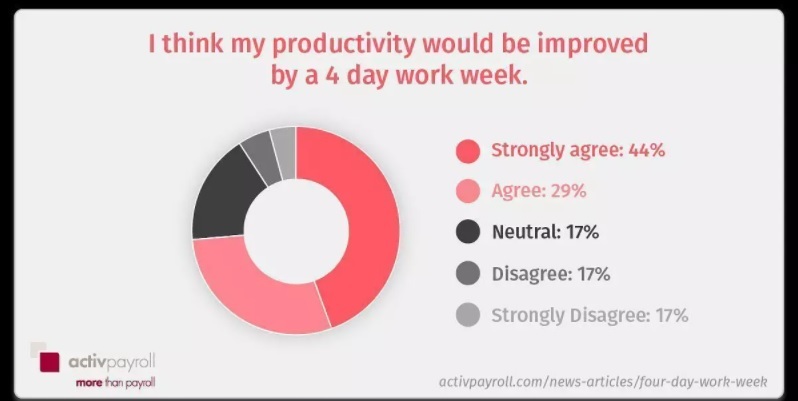The study was conducted in two phases, between 2015 and 2019, with 2,500 workers, about 1% of the working-age population in Iceland. In this program, participants were allowed to work four days/week without salary deduction.
According to the research team, work productivity and service quality at the pilot workplaces remained the same or even improved somewhat compared to the six-day/week workplaces. In addition, workers' lives significantly improved in all respects, from feeling less stressed and exhausted, to better conditions of physical and mental health when they could balance work and rest.
The results show that the idea of working less time but still ensuring efficiency can be realized, and it is being widely tested globally.
Optimistic tests
 |
|
Iceland's 4-day work week model has been a "great success". Photo: Unsplash
|
The study in Iceland is said to be a valuable lesson for other countries. This model was tested in a variety of working environments, from offices and hospitals in the capital city of Reykjavik to many other locations.
Similar to Iceland, several countries have piloted the 4-day work week and recorded a number of benefits such as significant reductions in pollution, reduced use of transport and most obviously, improved health of workers.
In 2020, the Prime Ministers of New Zealand and Finland proposed the idea of reducing the number of working days per week to four. Although there is not yet a national test like Iceland, many companies and corporations of these two countries have been ahead of the governments in applying the 4-day work week model.
From an idea once considered "crazy", the 4-day work week model is increasingly becoming a global trend and is widely applied on a business scale. In Spain, about 200 companies have pioneered this model since early 2020.
In early 2021, following a proposal from the Más País party, the Spanish government agreed to pilot the 4-day workweek model, with the participation of 3,000-6,000 workers across the country. It is expected that from August 2021, this program will be implemented over a period of 3 years, with an estimated cost of up to 50 million Euro.
Many companies in the UK, Denmark and Japan are also joining the trend of reducing workers' working hours per week. Two large enterprises in Japan, Uniqlo and Microsoft Japan, are pioneering with the participation of more than 10,000 employees. The Japanese parliament has officially discussed the proposal of the 4-day working week model in early 2021.
New model with many benefits
 |
|
More than 44% of Activpayroll survey respondents agreed that the 4-day work week model helps increase labor productivity.
|
According to a survey by Henley University (UK), many companies that tried this model found that employee productivity and efficiency increased significantly, specifically 20% for Killer Visual Strategies and 40% for Microsoft Japan. In addition, 64% of employees also saw an increase in productivity and 63% of the work recorded with better results.
When businesses shorten working hours, employees understand the importance of time, so they are forced to focus more on work and change the working process to improve work efficiency and productivity.
Another benefit of this model, from the perspective of human resource management, is that it will attract young human resources. For Generation Z, the key human resource of the future, practical benefits related to work-life balance are becoming their top priority. According to economist Julia Pollack, companies implementing the new model will attract more young applicants.
A survey by Henley University (UK) showed that when reducing the working hours per week, 70% of employees felt less stressed and 78% felt happier. The number of employees taking sick leave also decreased significantly. The reason for this is that once employees feel less stressed mentally, they have time to improve their overall health and better connect with family.
If this trend is legislated, it will become the most revolutionary change since the introduction of the eight-hour workday more than 100 years ago.
There are still many shortcomings
 |
|
Around 67% of Americans support working 4 days a week.
|
Although this model has proven its value, it still reveals shortcomings once it is widely applied.
Firstly, this model may not be suitable for some areas. There are industries that cannot reduce workdays such as manufacturing, engineering, construction and services, because they require continuity and availability of workers.
Secondly, reducing work days can affect the customer experience for services. Besides, this requires the employee's work management ability to be optimized to complete the previous workload in 32 hours/week.
Regarding this new model, Ruby Nguyen, Chief Operating Officer of the media company Vietcetera, said: "Vietnamese labor productivity is still low compared to other countries in the region, not to mention developed countries. If productivity is already low and working time is reduced, it will be difficult for businesses to compete in the market.”
Currently, the labor productivity of Vietnamese people is only 7.2% compared to Singapore, 18.4% compared to Malaysia, 36.2% compared to Thailand. In addition, Vietnam's key industry is the manufacturing sector, where up to 98% of enterprises are small, medium and micro. Therefore, the policy of reducing working hours will hardly be implemented immediately in Vietnam.
However, some businesses can still apply reduced working hours right now. They can experiment with a small, highly productive team/division, and then measure efficiency/productivity to compare between a 4-day and 5-day workweek. If the results are positive, they can expand to other departments.
Viet Anh

Youth prefer freelancing, working from anywhere
As technology is developing at a lightning speed, more and more young people want to give up their dedicated desks in offices and work from anywhere in the world.

Taking care of yourself while working from home
In early 2020, when Vietnam officially announced the Covid-19 epidemic, many businesses allowed their employees to work from home even though the remote working culture was not common in Vietnam.